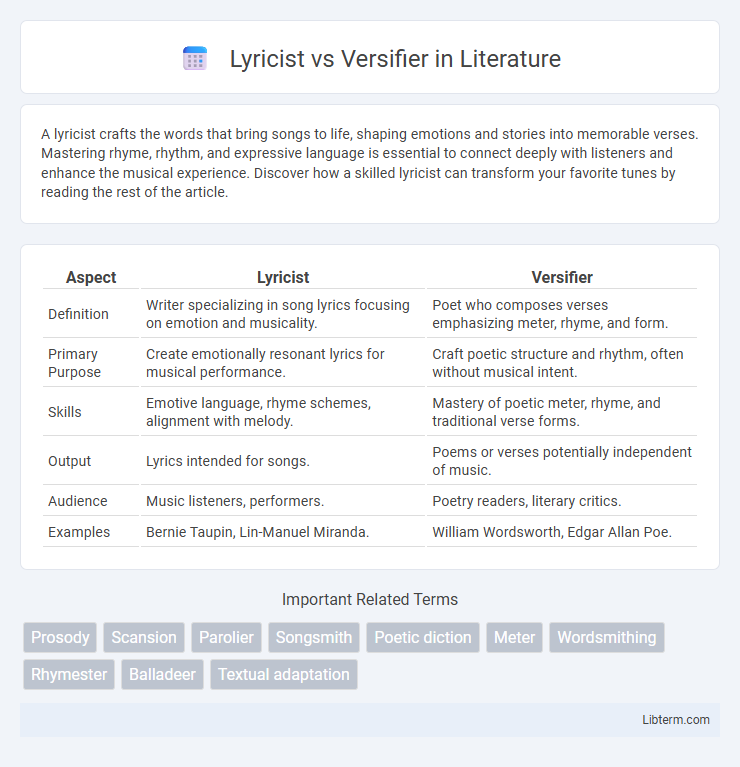A lyricist crafts the words that bring songs to life, shaping emotions and stories into memorable verses. Mastering rhyme, rhythm, and expressive language is essential to connect deeply with listeners and enhance the musical experience. Discover how a skilled lyricist can transform your favorite tunes by reading the rest of the article.
Table of Comparison
| Aspect | Lyricist | Versifier |
|---|---|---|
| Definition | Writer specializing in song lyrics focusing on emotion and musicality. | Poet who composes verses emphasizing meter, rhyme, and form. |
| Primary Purpose | Create emotionally resonant lyrics for musical performance. | Craft poetic structure and rhythm, often without musical intent. |
| Skills | Emotive language, rhyme schemes, alignment with melody. | Mastery of poetic meter, rhyme, and traditional verse forms. |
| Output | Lyrics intended for songs. | Poems or verses potentially independent of music. |
| Audience | Music listeners, performers. | Poetry readers, literary critics. |
| Examples | Bernie Taupin, Lin-Manuel Miranda. | William Wordsworth, Edgar Allan Poe. |
Defining Lyricist and Versifier
A lyricist is a creative artist who crafts original song lyrics, emphasizing emotional expression and thematic depth to complement musical compositions. A versifier specializes in writing poetry with a strict focus on rhyme and meter, often prioritizing form and structure over personal or emotional content. While lyricists integrate their words with melody to enhance the song's mood, versifiers concentrate on technical aspects of verse without necessarily aligning with musical elements.
Historical Origins of Both Roles
Lyricists and versifiers have distinct historical origins rooted in ancient literary traditions. Lyricists originated from the lyrical poetry of Ancient Greece, where poets like Sappho crafted personal and emotional verses accompanied by the lyre. Versifiers emerged from medieval European courts, focusing on structured rhyme and meter to compose formal poetry often used in storytelling and chronicling events.
Key Skills: Lyricist vs Versifier
Lyricists excel in crafting emotionally resonant and rhythmically engaging song lyrics tailored to musical composition, demonstrating skills in rhyme schemes, meter, and storytelling that align with melodies. Versifiers specialize in the structured creation of poetry, emphasizing formal meter, poetic devices, and precise word choice to evoke imagery and mood independent of music. Both require linguistic creativity and mastery of language, but lyricists prioritize musicality and singability, while versifiers focus on poetic form and literary craftsmanship.
Artistic Intent and Purpose
A lyricist crafts poetic lyrics with the primary intent of expressing deep emotions and storytelling through music, emphasizing rhythm, rhyme, and mood to connect with listeners on a personal level. A versifier focuses on composing structured verses, often for literary purposes, prioritizing form, meter, and linguistic precision over emotional expression. The artistic purpose of a lyricist centers on enhancing musical composition and emotional resonance, whereas a versifier aims to achieve aesthetic and intellectual impact through carefully constructed poetry.
Influence of Language and Structure
Lyricists harness poetic language and emotional nuance to craft songs that resonate deeply with listeners, prioritizing fluidity and melodic integration. Versifiers emphasize structured meter and rhyme schemes, often adhering to traditional poetic forms that highlight linguistic precision and rhythmic consistency. The influence of language and structure in lyricism versus versification shapes the expressive possibilities, where lyricists innovate for musicality and emotional impact while versifiers focus on linguistic craftsmanship and formal constraints.
Creative Process Compared
Lyricists craft emotionally resonant, rhythmically precise song lyrics that align closely with melodies and musical structure, emphasizing thematic cohesion and vocal delivery. Versifiers focus on the formal construction of poetry, employing meter, rhyme schemes, and literary devices to create standalone verses independent of music. The creative process for lyricists often involves collaboration with composers, while versifiers typically work in solitary reflection to refine linguistic artistry and thematic depth.
Impact on Music and Literature
Lyricists shape the emotional depth and narrative of music by crafting words that resonate with listeners, often influencing popular culture and song interpretation. Versifiers contribute to literature by focusing on form and meter, enriching poetry with rhythmic and structural techniques that enhance the aesthetic experience. Both roles impact artistic expression, but lyricists primarily drive the connection between music and audiences, while versifiers advance literary traditions through poetic craftsmanship.
Notable Figures in Each Field
Notable lyricists like Bob Dylan and Leonard Cohen craft emotionally resonant songs with profound storytelling and poetic depth, influencing generations of music lovers worldwide. In contrast, versifiers such as Alexander Pope and William Wordsworth excel in structured poetic forms, emphasizing meter and rhyme to create timeless literary works. Both fields showcase unique mastery of language, with lyricists specializing in song lyrics and versifiers in traditional poetry.
Modern Evolution of Lyricists and Versifiers
Modern evolution of lyricists highlights their role as storytellers who blend poetic artistry with contemporary music production, often collaborating closely with artists to craft emotionally resonant and market-driven songs. Versifiers today emphasize structured verse writing, preserving traditional rhyme and meter, yet adapt their skills for diverse media including digital platforms, advertising, and spoken word performances. Both lyricists and versifiers increasingly utilize digital tools and social media to reach wider audiences and innovate the boundaries of lyrical expression.
Choosing Between Lyricist and Versifier Paths
Choosing between lyricist and versifier paths hinges on creative intent and technical skill; lyricists prioritize emotional resonance and musicality, crafting words that complement melodies and evoke feelings. Versifiers focus on structured poetic forms, emphasizing meter, rhyme schemes, and literary devices to create standalone works of art. Understanding personal strengths in musical collaboration versus poetic craftsmanship guides the optimal career or hobby direction.
Lyricist Infographic

 libterm.com
libterm.com